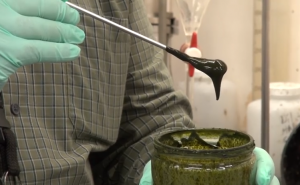As the world’s population grows, our sources of fossil fuel is becoming more limited. At the same time, scientists are trying to derive fuels that can be obtained by biological material. One idea is to use algae as our new source of bio-fuel.
Algae are eukaryotic organisms that grow on the seafloor. The species in this group of organisms range significantly in sizes: from a unicellular diatom around 0.5mm to a multicellular kelp that can grow up to 50 feet long. Algae is one of the most abundant group of organism on Earth. It’s no wonder that scientists have been trying to find ways to convert these algal species into bio-fuels in the last half-century.
Recently, the Pacific Northwest National Laboratory (PNNL) have claimed that they have successfully produced crude oil from micro-algae with a process called hydrothermal liquefaction. The idea is to mix algae with water and with a ratio of 1:5. Next, mixture is sent through a tube about 350 °C and 3,000 psi (unit to measure pressure: pound force per square inch) for about 30 minutes. The process would compress most of the biological matter into crude oil, similar to the natural process of fossilization.
Here is a short video by PNNLgov on YouTube explaining the process of the conversion of algae into crude oil. 
If this process is viable for mass production, it would be relatively inexpensive since it would only require the machine to process the mixture. An advantage to this is that drying the algae is not necessary. Moreover, leftover material that were not turned into oil can be used as fertilizers. Researchers also predicted that the price per gallon of bio-fuel made from algae could be less than the current gasoline equivalent.
Depletion of algae, however, will soon become a new issue. Scientists now are skeptical on the costs and energy use to cultivate algae. Research done by Raphael Slade and Ausilio Bauen explains the problems with energy and carbon balance, environmental impacts and production cost if algae cultivation is to be industrialized. Building infrastructures that are required to process many tonnes of algae per day will result in high cultivation costs.
Despite these issues, algal species hold a promise in becoming the next prominent source for bio-fuel. It is the fastest growing group of organisms on Earth. With the research done by PNNL, they hope to find solutions in regards to the cultivation issues in the next few years. Perhaps by then, we can finally break free from paying expensive fees for gas.
– Alison Fung



